Overview
A B2B integration platform serves as a vital software solution that enables seamless data and process exchanges between enterprises. This capability significantly enhances collaboration and operational efficiency. In today’s competitive landscape, where digital transformation is paramount, the importance of such platforms cannot be overstated. They automate workflows, support various communication protocols, and are essential for organizations striving to excel.
Are you ready to elevate your business operations? Embrace the power of integration platforms to streamline your processes and foster collaboration across your enterprise.
Introduction
In the dynamic realm of business, the seamless integration of operations with trading partners stands as a pivotal factor for success. B2B integration platforms lead this transformation, empowering organizations to automate workflows, enhance data sharing, and foster collaboration across diverse sectors.
As businesses increasingly acknowledge the significance of operational efficiency, the adoption of these platforms is anticipated to surge significantly in the years ahead.
This article explores the multifaceted domain of B2B integration, examining its importance, the various types of solutions available, and the key features that render these platforms effective. Furthermore, it highlights the benefits, challenges, and emerging trends that shape this essential aspect of modern commerce, with a particular emphasis on the innovative solutions provided by Avato.
Defining B2B Integration Platforms: An Overview
A B2B integration platform is a crucial software solution that enables the seamless transfer of data and processes among enterprises. By connecting disparate systems, these platforms automate workflows, enhance information sharing, and improve collaboration with trading partners. In 2025, a substantial proportion of enterprises is expected to employ B2B integration platforms, reflecting a growing recognition of their significance in operational efficiency.
These platforms support a variety of protocols and standards, including Electronic Data Interchange (EDI) and Application Programming Interfaces (APIs), ensuring compatibility and effectiveness in data exchange. As organizations increasingly prioritize digital transformation, the adoption of B2B integration platforms is anticipated to rise, with B2B marketing expenditure on paid advertising expected to grow by 20% each year. This trend underscores the vital role that efficient unification plays in contemporary corporate strategies.
By optimizing communication and reducing manual procedures, the B2B integration platform is indispensable in sectors like banking, healthcare, and government, where prompt and precise data exchange is essential. The hybrid connection platform exemplifies this by simplifying complex connection projects and unlocking isolated legacy systems in weeks rather than months. As Gustavo Estrada highlights, ‘Avato has the ability to simplify complex projects and deliver results within desired time frames and budget constraints.’
This illustrates how the platform not only addresses the challenges of merging fragmented data but also enhances operational capabilities, equipping businesses to respond effectively to changing market needs. Overall, the B2B integration platform, particularly Avato’s, is essential for maximizing legacy system value and transforming B2B customer experiences.
The Significance of B2B Integration in Today’s Business Landscape
In the rapidly evolving landscape of 2025, B2B collaboration has emerged as a cornerstone for organizational success. It empowers businesses to swiftly adapt to market fluctuations, optimize supply chains, and elevate customer experiences. By automating data exchanges and minimizing manual data entry, companies can significantly reduce errors, enhance operational efficiency, and expedite decision-making processes.
Moreover, effective B2B connectivity strengthens partnerships by ensuring the timely and accurate flow of information, which is vital for fostering trust and collaboration. As organizations increasingly adopt digital transformation, the demand for a robust B2B integration platform becomes essential for sustaining a competitive advantage and operational flexibility.
Current trends indicate that 92% of B2B marketers are leveraging social media to enhance their unification strategies. This highlights the importance of combining communication channels to improve engagement. Additionally, 87% of B2B marketers prioritize the informational needs of their audience over direct sales messages. This underscores the necessity of delivering value through integrated solutions that resonate with partners and customers alike.
Case studies show that businesses adopting B2B collaboration experience significant enhancements in supply chain efficiency. For example, organizations that use email marketing as part of their overall strategy report an average open rate of 26.7%. This demonstrates the effectiveness of personalized communication in driving engagement. This corresponds with the observations from Gustavo Estrada, who remarked, ‘The company has simplified complex projects and delivered outcomes within intended time frames and budget limits.’ This highlights the real-world influence of efficient merging solutions.
Furthermore, generative AI has emerged as a transformative force in financial services, with a 60% increase in its use for enhancing customer experience through sophisticated chatbots and virtual assistants. The company’s proficiency in hybrid connectivity enables financial organizations to utilize these advancements, optimizing operations and enhancing productivity across departments. By streamlining intricate processes and offering real-time oversight, the company guarantees that organizations can maneuver through the challenges of contemporary markets while greatly lowering expenses.
Avato’s hybrid unification platform features, such as operational visibility and issue resolution capabilities, play a crucial role in maximizing and extending the value of legacy systems. In the current commercial landscape, the importance of B2B collaboration cannot be exaggerated. It not only streamlines operations but also enhances customer experiences, positioning companies to thrive in a competitive landscape.
As emphasized by industry specialists, the capability to adjust to evolving requirements through a dependable B2B integration platform is crucial for maintaining growth and innovation. Avato’s strong technology framework aids these unification efforts, ensuring companies can navigate the complexities of contemporary markets.
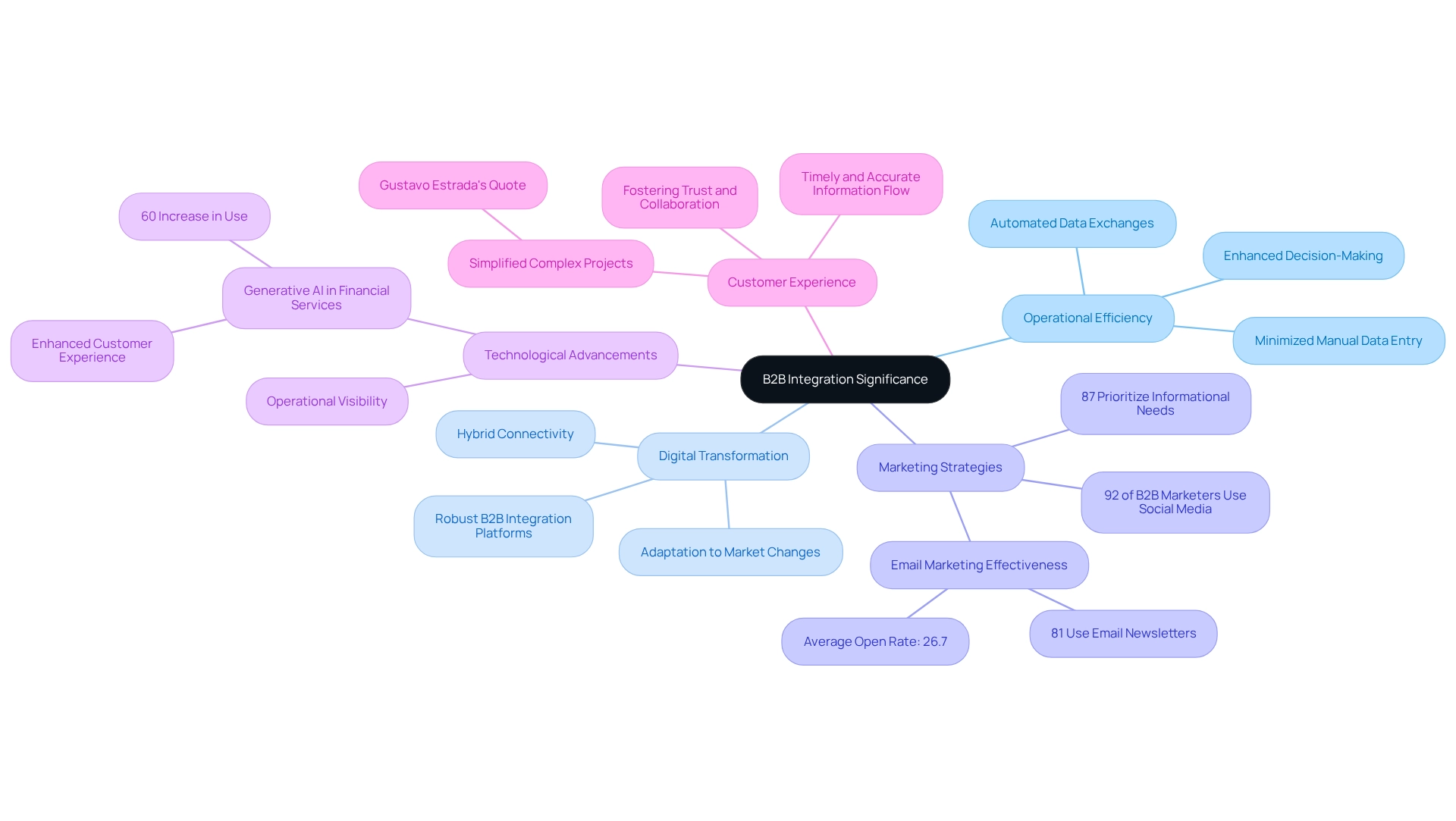
Exploring Different Types of B2B Integration Solutions
B2B connectivity solutions encompass a variety of types, each specifically designed to meet distinct organizational needs and functionalities. The primary categories include:
- EDI (Electronic Data Interchange): A longstanding method enabling organizations to exchange documents electronically in a standardized format, EDI streamlines transactions such as purchase orders and invoices, significantly enhancing operational efficiency.
- API (Application Programming Interface): APIs facilitate real-time data transfer between applications, allowing for dynamic interactions and connections that can adapt to evolving requirements.
- iPaaS (Integration Platform as a Service): iPaaS solutions offer a cloud-based platform for connecting applications and data across various environments, streamlining the unification process and reducing time to market.
- B2B Gateway: Acting as a bridge between disparate systems, B2B Gateways ensure secure and efficient data transfer between trading partners, which is essential for maintaining compliance and operational integrity.
- Managed File Transfer (MFT): MFT solutions focus on the secure transfer of files between organizations, often incorporating advanced encryption and compliance features to safeguard sensitive information.
Each type of solution presents unique benefits, and companies must carefully assess their specific needs to identify the most suitable unification approach. As the market continues to evolve, understanding the effectiveness of these solutions becomes increasingly critical, particularly given the growing reliance on mobile devices, which account for over 50% of conversions in B2B transactions. This insight underscores the necessity for a B2B integration platform that can seamlessly connect various systems and enhance overall operational capabilities.
This dedicated hybrid solution exemplifies how these systems can be effectively implemented. By focusing on streamlining complex connections and maximizing the value of legacy systems, the company empowers organizations to future-proof their operations. According to Gustavo Estrada, ‘The company has simplified complex projects and delivered results within desired time frames and budget constraints.’
This practical viewpoint highlights the efficiency of Avato’s solutions in overcoming the challenges faced by companies in their unification efforts. Furthermore, the company distinguishes itself from competitors by significantly reducing costs while enhancing operational capabilities, as detailed in the case study titled “Value Proposition of the company.” Key trends in the application unification market also indicate that innovative technologies are driving profitability, making it essential for businesses to adopt effective unification strategies through a B2B integration platform.
Avato’s platform further enhances its value proposition by providing real-time monitoring and alerts on system performance.
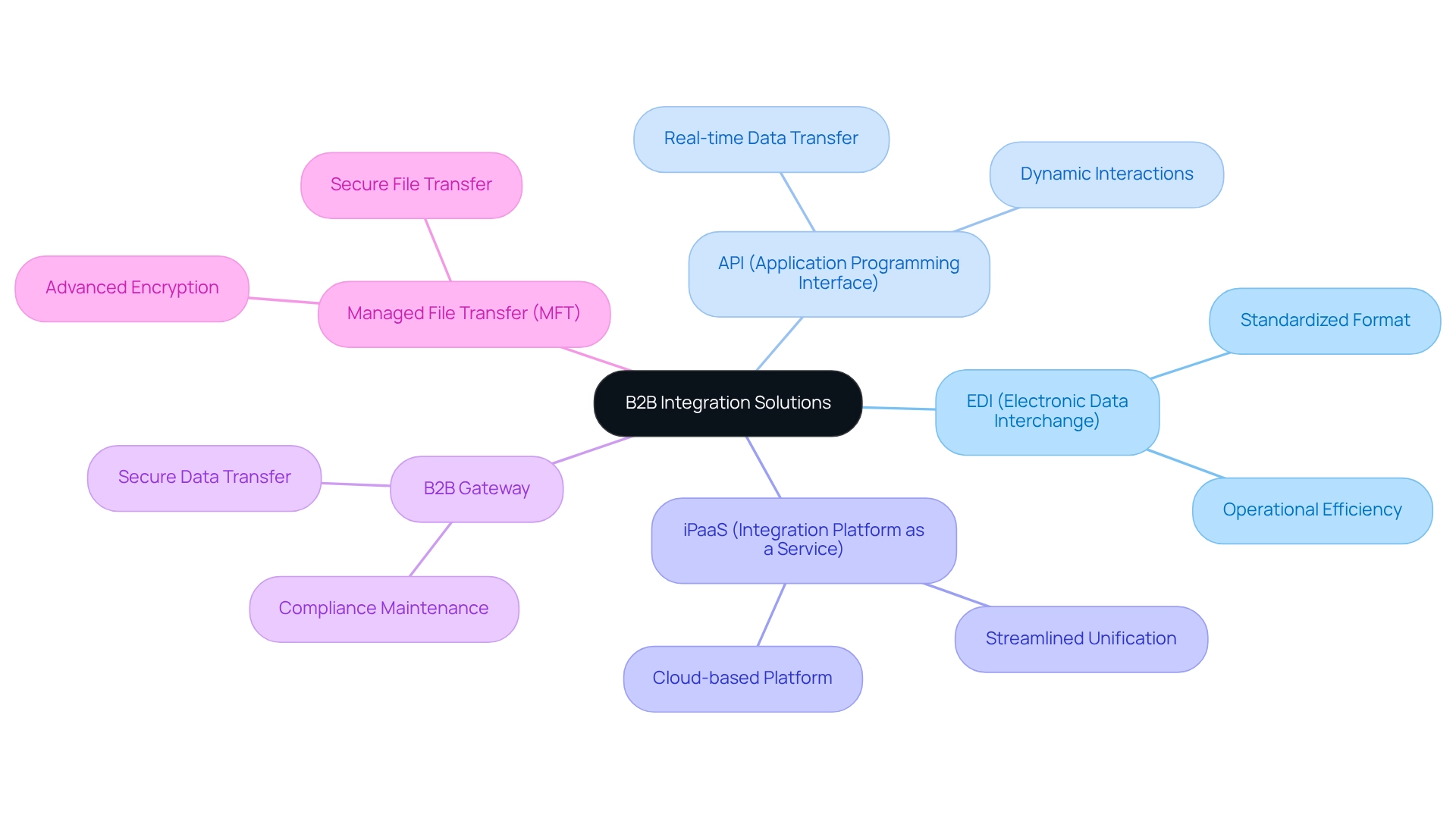
Essential Features of an Effective B2B Integration Platform
An effective B2B integration platform must encompass several critical features to ensure seamless operations and robust performance. Scalability is paramount; the platform must be crafted to expand with the organization, adeptly handling rising data volumes and accommodating new trading partners. This adaptability is vital as businesses expand and evolve.
Security is non-negotiable. Implementing robust security measures, including encryption and stringent access controls, is essential to safeguard sensitive data during transmission. Recent statistics reveal an alarming increase in security breaches associated with B2B connections, underscoring the necessity of prioritizing security.
Real-time Monitoring capabilities are equally essential, enabling users to oversee connections in real-time. This feature allows for the swift detection and resolution of issues, thereby minimizing downtime and enhancing operational efficiency, while also boosting user confidence in the system’s reliability.
Reliability is a cornerstone of B2B SaaS applications. Scalable systems that incorporate failover mechanisms ensure continuous service during component failures, further enhancing user confidence and satisfaction. A User-friendly Interface is crucial; a straightforward interface enables users to manage connections without requiring extensive technical expertise, facilitating quicker onboarding and adoption across teams.
Support for Multiple Protocols is another essential feature. The platform should accommodate various communication protocols, such as EDI, API, and AS2, ensuring compatibility with diverse partners and systems. Additionally, Data Transformation Capabilities are vital for efficient data mapping and transformation tools. These tools facilitate smooth data flow and connection by changing data formats between various systems. Leveraging XSLT, a highly-tuned declarative programming language, can significantly enhance these capabilities, reducing labor in transformative tasks and minimizing programming errors through schema validation, ultimately leading to substantial cost savings.
User manuals can offer practical advice on using XSLT effectively in development projects, ensuring that teams can maximize its benefits. Comprehensive Reporting features empower businesses to analyze performance and pinpoint areas for improvement, fostering continuous optimization of processes.
These features collectively enhance the functionality and reliability of the B2B integration platform, enabling businesses to achieve their goals efficiently. As emphasized in recent surveys, 67% of companies invest in connections to enhance close rates, underscoring the significance of utilizing such tools. The challenges companies encounter with application unification further highlight the necessity of these features, making them essential for preserving a competitive advantage.
The company guarantees round-the-clock availability for essential connections, thereby strengthening the reliability aspect of its B2B integration platform. With a deep commitment to designing technological foundations, the company pioneers hybrid connection solutions that link legacy systems with contemporary demands. This approach offers IT teams a comprehensive perspective of interconnected systems and data flows, boosting collaboration and efficiency in project implementations. Moreover, Avato’s dedication to regulatory compliance and security assessments ensures that all connections meet industry standards, providing reassurance for banking IT managers.
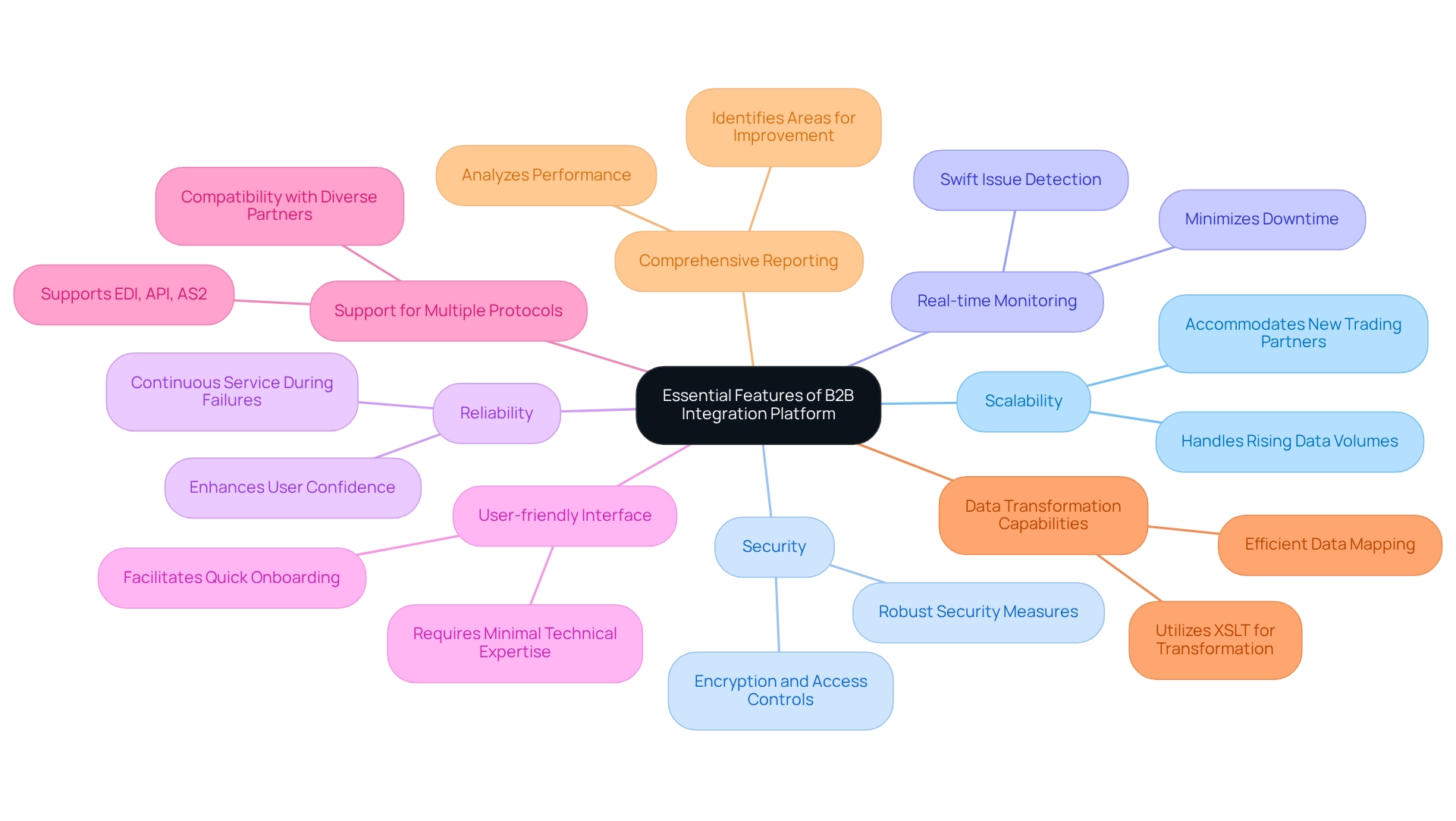
Benefits of B2B Integration: Enhancing Efficiency and Collaboration
Establishing a B2B integration platform presents numerous benefits that can significantly enhance operational processes.
-
Increased Efficiency: Automating data exchanges and workflows drastically reduces manual tasks, resulting in faster processing times and lower operational costs. This efficiency is paramount, given that 85% of buyers establish purchase requirements before engaging with sales, underscoring the necessity for streamlined operations.
-
Improved Data Accuracy: Automation minimizes human errors associated with manual data entry, ensuring that the information exchanged between partners is both accurate and reliable. This accuracy is essential for maintaining trust in business relationships.
-
Enhanced Collaboration: A B2B integration platform fosters improved communication and collaboration among trading partners, leading to stronger relationships and enhanced service delivery. This collaborative environment is vital for adapting to evolving customer behaviors and market demands.
As noted by Gustavo Estrada, Acting Provincial Director at BC Provincial Health Services Authority, Avato’s platform simplifies complex projects and delivers results within desired time frames and budget constraints, showcasing its effectiveness in enhancing collaboration and operational visibility.
-
Faster Time-to-Market: Streamlined processes enable companies to respond swiftly to market demands, allowing for quicker launches of new products or services—an increasingly critical factor in today’s fast-paced commercial landscape.
-
Cost Savings: By reducing manual processes and improving operational efficiency, companies can achieve significant cost reductions over time, making the B2B integration platform a financially sound investment.
The hybrid platform developed by the company is designed to greatly lower expenses while enhancing the value of legacy systems, ensuring that organizations can meet their financial objectives.
-
Scalability: A B2B integration platform is crafted to scale effortlessly, accommodating growing organizational needs and enabling entities to expand their partner networks without incurring significant overhead.
-
Real-Time Monitoring and Alerts: The hybrid platform provides immediate monitoring and notifications regarding system performance, empowering companies to proactively address challenges and maintain optimal operational efficiency.
These advantages highlight the essential role of a B2B integration platform in fostering business success and sustaining a competitive edge in the market, especially as organizations navigate the complexities of contemporary commerce. Furthermore, B2B marketers face challenges such as data privacy concerns and budget management, as outlined in the case study on challenges for B2B marketers in 2025. Implementing intelligent solutions like Avato’s B2B integration platform can help organizations stay ahead of the curve and continue to drive results.
Moreover, connecting with ERP data can provide personalized eCommerce experiences, further enhancing the value of B2B collaboration.
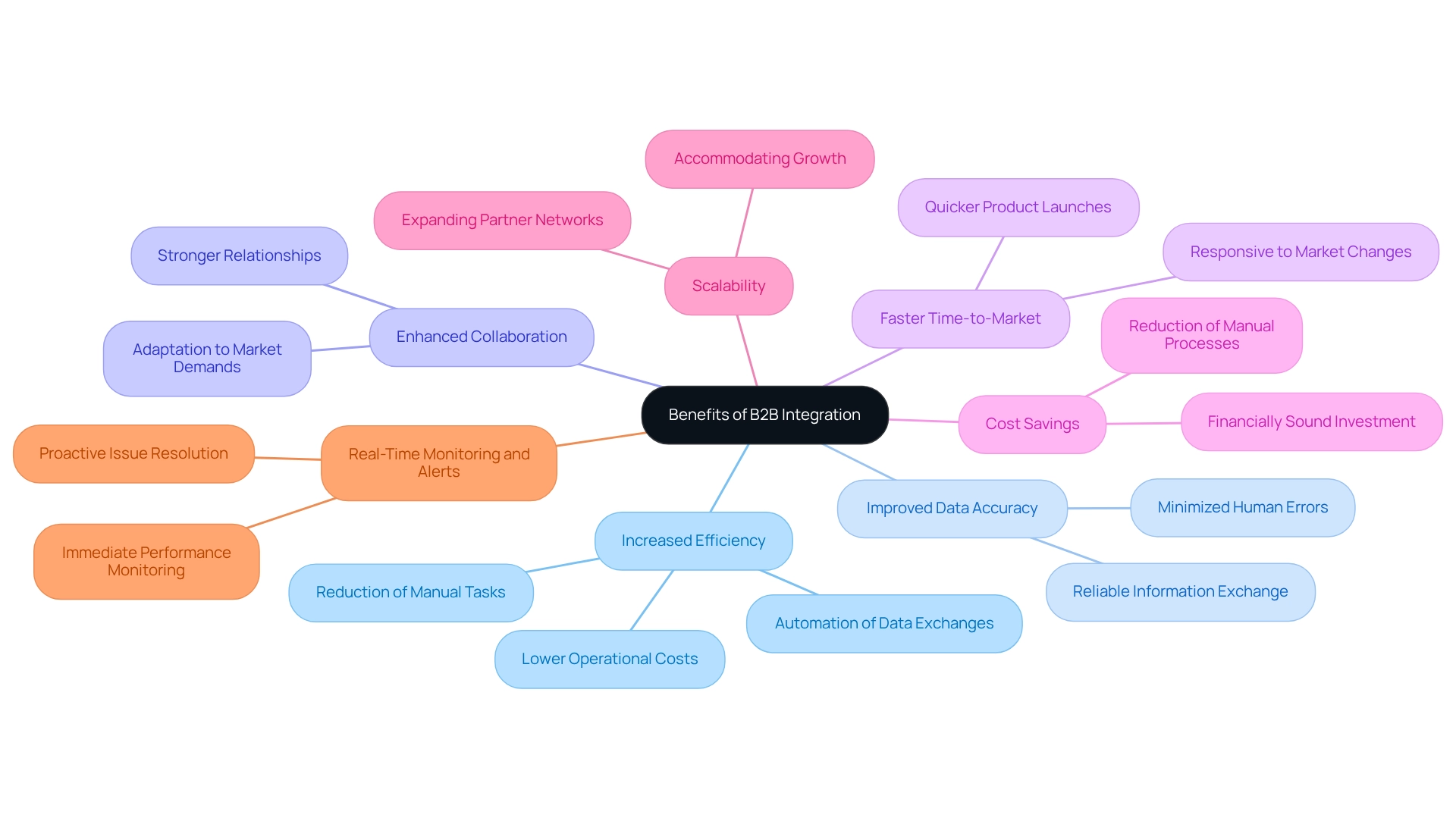
Challenges in B2B Integration: Navigating Common Pitfalls
B2B integration presents numerous advantages; however, organizations frequently encounter several challenges during its implementation.
-
Data Standardization: The variety of data formats and standards employed by various partners creates significant obstacles in achieving smooth unification. Without a unified approach, data discrepancies can lead to errors and inefficiencies.
-
Legacy Systems: Many organizations still rely on obsolete systems that lack compatibility with contemporary connection methods. This reliance complicates the integration process, often resulting in extended timelines and increased costs. In fact, a considerable share of enterprises today still functions with legacy systems, severely hindering their ability to adapt to new technologies. A dependable, future-ready technology stack is designed to assist businesses in navigating these challenges and adapting to changing demands, ensuring efficient integration of new tools with existing assets.
-
Security Concerns: The transfer of sensitive data between organizations raises critical security risks. Establishing robust security protocols is crucial to protect against possible breaches, ensuring that data integrity and confidentiality are upheld during the incorporation process. Avato guarantees 24/7 availability for essential connections, highlighting the significance of dependability in tackling these security issues while also complying with regulatory standards and performing comprehensive security assessments.
-
Complexity of Unification: Unifying multiple systems and applications can be inherently complex. It requires careful planning and execution to avoid disruptions that could affect operational activities. Organizations must navigate this complexity to ensure that all components work harmoniously together. As Hasan Fatih Ekşioğlu, SAP Integration Team Lead, states, “B2B connectivity is the automation of commercial processes and communication between two or more organizations,” underscoring the significance of effective collaboration in modern practices.
-
Change Management: Resistance to change from staff can present a considerable obstacle to the effective adoption of new unification solutions. Effective change management strategies, including comprehensive staff training programs, are crucial to facilitate a smooth transition and encourage buy-in from all stakeholders. Investing in training ensures that staff are comfortable with the new platform and fosters a culture of innovation within the organization. As outlined in the FAQs, mobilizing stakeholders early in the process and modeling business processes can significantly enhance the effectiveness of these strategies.
Furthermore, numerous older B2B connection platforms lack the flexibility to customize processes to specific company requirements, exacerbated by a shortage of technical expertise to create tailored workflows or scripts. By acknowledging and tackling these challenges, organizations can better prepare for the merging process. Applying focused approaches to reduce risks will improve the chances of favorable results, ultimately leading to more efficient and effective B2B collaboration efforts.
A case study from INVIXO demonstrates how unification solutions can transform business processes and enhance operations, highlighting how Avato’s products can be utilized to attain comparable outcomes.
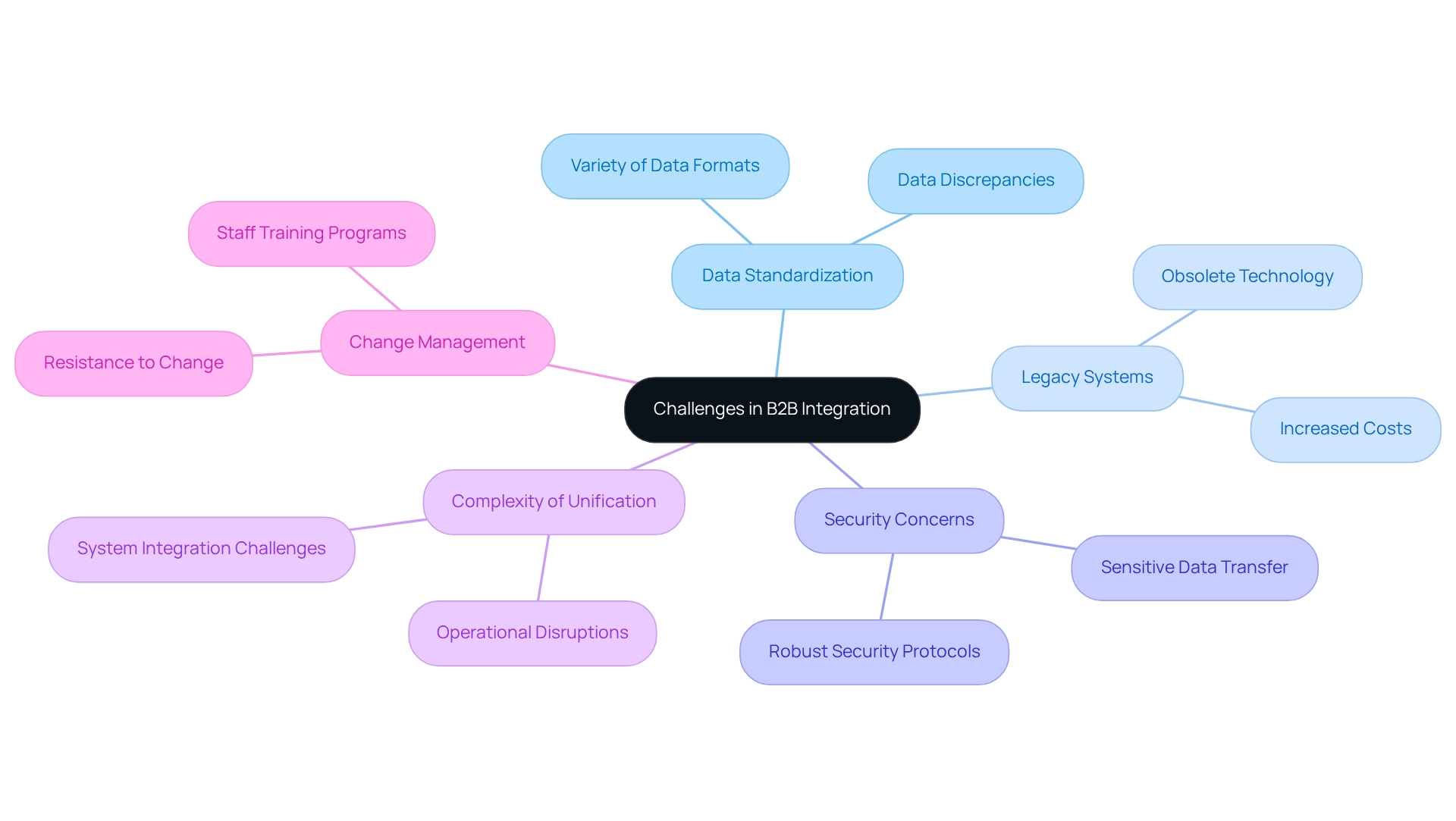
Ensuring Security and Compliance in B2B Integration
Security and compliance are paramount in B2B connections, particularly for organizations implementing a B2B integration platform in regulated industries such as banking and healthcare. Key considerations include:
- Data Encryption: Robust encryption protocols for data, both in transit and at rest, are vital for safeguarding sensitive information against unauthorized access. Recent statistics reveal that phishing remains a prevalent threat, accounting for 33% of attacks as the second most common infection vector. This highlights the necessity for strong encryption measures to protect against such vulnerabilities. Furthermore, technologies like searchable encryption enable organizations to search encrypted data without compromising security, addressing common misconceptions about encryption.
- Access Controls: Implementing stringent access measures is crucial to ensure that only authorized individuals can access sensitive information and processes, thereby minimizing the risk of data breaches and enhancing overall security. As emphasized by Blind Insight, building privacy-preserving applications that operate on sensitive data is critical. The company empowers organizations to establish robust access controls, fortifying the security of their connection environments.
- Compliance with Regulations: Adhering to industry-specific regulations, such as GDPR and HIPAA, is mandatory for organizations. While compliance rates with these regulations have shown improvement, continuous monitoring and adaptation are essential to meet evolving standards. The B2B integration platform supports compliance efforts by providing the necessary tools and frameworks that organizations need to effectively meet regulatory requirements.
- Regular Audits: Conducting regular security audits and assessments is critical for identifying vulnerabilities and ensuring compliance with established security standards. These audits assist organizations in staying ahead of potential threats and ensuring a secure environment. The B2B integration platform facilitates this process by providing features that enhance operational visibility, enabling organizations to closely monitor their connectivity activities.
- Incident Response Plans: Developing and maintaining comprehensive incident response plans equips organizations to react swiftly to potential security breaches. This preparedness minimizes damage and ensures business continuity, reinforcing trust with partners and customers. Avato’s commitment to providing a robust foundation for digital transformation projects includes support for incident response strategies, ensuring organizations are adequately equipped to tackle any security challenges.
As the technology landscape evolves, new strategies are being developed to minimize information leakage and enhance performance, further strengthening security measures in B2B collaboration. By prioritizing these security and compliance measures, organizations can not only protect their data and operations but also foster trust and reliability in their use of a B2B integration platform for relationships. The projected growth of the energy IT and cybersecurity market, anticipated to exceed $19 billion, underscores the increasing importance of cybersecurity in this context.
Choosing the Right B2B Integration Platform for Your Business
Selecting the right B2B integration platform is vital for the success of unification initiatives. Organizations must consider several key factors:
- Business Needs: Assess your organization’s specific integration requirements, including the types of data and systems that need interconnection. A clear understanding of these needs will guide the selection process effectively.
- Scalability: Opt for a platform that can grow with your organization, accommodating new partners and increasing data volumes as operations expand. Scalability is essential for sustained success; a dependable technology stack helps organizations adapt to shifting demands and maintain a competitive edge.
- Ease of Use: A user-friendly interface is critical, enabling straightforward management of connections without requiring extensive technical expertise. This accessibility can significantly boost productivity.
- Support for Multiple Protocols: Ensure the platform supports various communication protocols to guarantee compatibility with different partners. This flexibility is crucial in a diverse business landscape.
- Security Features: Evaluate the security measures offered by the platform, including encryption, access controls, and compliance capabilities. Robust security is non-negotiable, particularly in regulated industries.
- Vendor Support: Consider the level of support provided by the vendor, including training, documentation, and ongoing assistance. Strong vendor support can significantly impact the effective execution and maintenance of the unification platform. Avato, with its dedicated team of specialists, exemplifies the importance of vendor support in enhancing operational capabilities and building client trust.
By thoroughly assessing these factors, organizations can select a B2B integration platform that aligns with their strategic objectives and enhances operational capabilities. Notably, 85% of buyers establish their purchase requirements before contacting sales, underscoring the importance of thorough preparation in the selection process. Furthermore, expert insights indicate that collaborative partnerships can drive revenue and minimize churn, as noted by Kelsey Johnson, Head of Marketing: “Collaborative partnerships are powerful. They can drive and scale revenue, assist in sales, and reduce churn.” This highlights the value of choosing the right platform for sustained business growth. Additionally, a pertinent statistic reveals that Typeform users with a Zapier connection are 40% less likely to leave, demonstrating the advantages of successful collaboration partnerships.
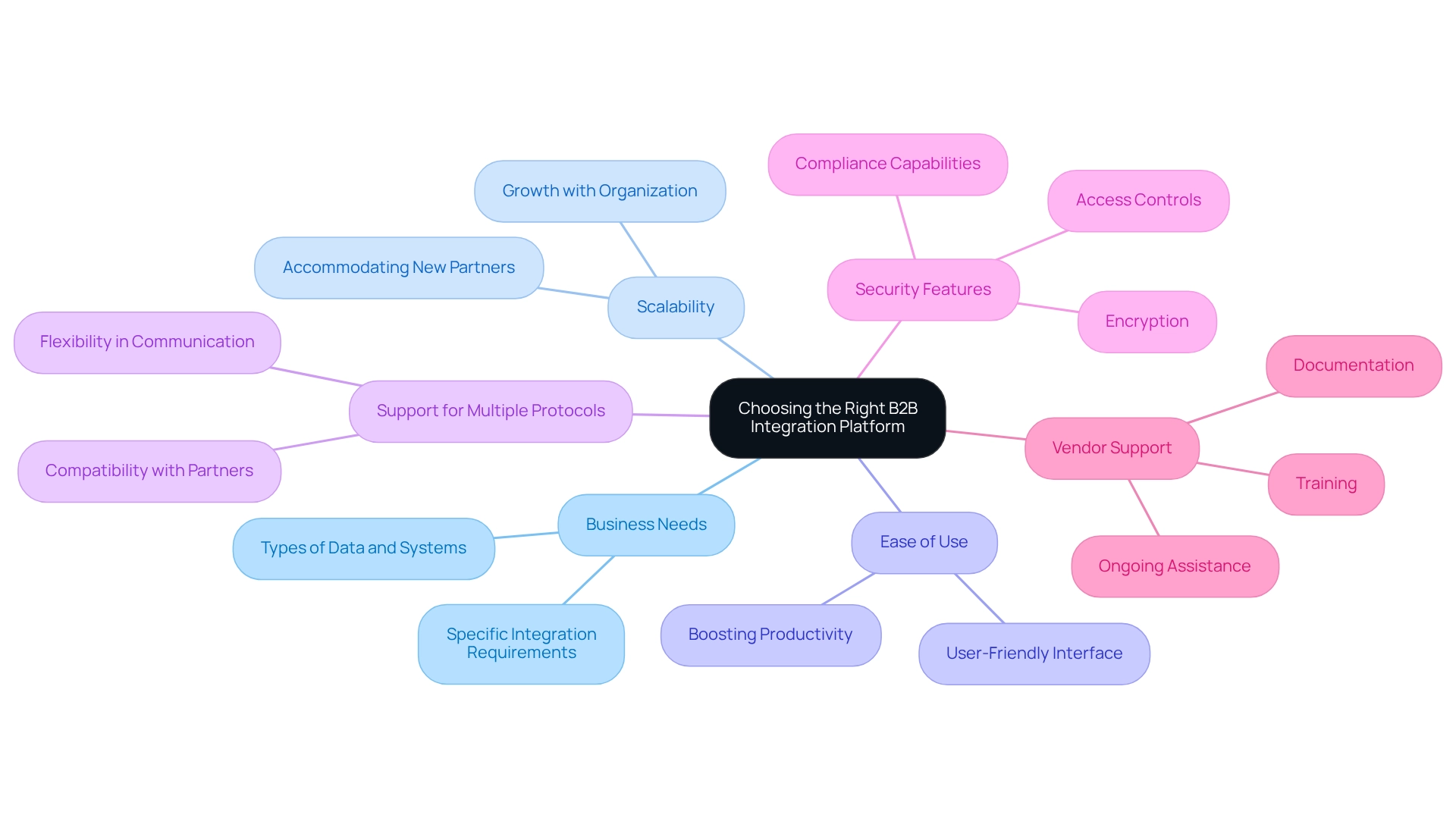
Case Studies: Successful Implementations of B2B Integration
Many organizations have effectively utilized a B2B integration platform, achieving significant advantages across multiple sectors, particularly with Avato’s specialized hybrid linking platform. For instance, consider the following case studies:
- Case Study: Retail Sector – A prominent retailer linked its supply chain systems with those of its suppliers via a B2B integration platform. This initiative not only improved inventory management and reduced stockouts but also fostered enhanced collaboration with suppliers, culminating in a remarkable 20% increase in sales.
- Case Study: Healthcare Sector – A leading healthcare provider implemented a B2B integration platform to enhance the sharing of patient information with partner hospitals. This unification significantly enhanced patient care coordination, reduced administrative expenses, and ensured adherence to strict healthcare regulations, ultimately improving the quality of care provided. The significance of this unification in healthcare is further highlighted by the fact that organizations adopting Avato’s B2B solutions report notable enhancements in operational capabilities and customer satisfaction.
- Case Study: Manufacturing – A manufacturing company utilized a B2B integration platform to automate order processing and invoicing with its distributors. This strategic decision led to quicker order fulfillment, reduced errors, and enhanced cash flow management, demonstrating the platform’s effectiveness in optimizing operational workflows.
These case studies highlight the versatility and benefits of Avato’s B2B integration platform across various sectors, showcasing its potential to enhance operational efficiency and promote business growth. Moreover, organizations that adopt such solutions often experience improved data precision and fewer operational mistakes, as emphasized by industry specialists. For example, Yana Khodun notes, “APIs can automate tasks that we do over and over again. This frees up our time and helps us avoid mistakes. With fewer errors, our data is more accurate, and we can work much more efficiently.” This sentiment reflects the broader trend where companies that adopt a B2B integration platform, especially through Avato’s solutions, report significant improvements in their operational capabilities and customer satisfaction.
In a dynamic B2B marketing environment, a data-driven strategy is crucial for effectively engaging target audiences and optimizing the advantages of collaboration.
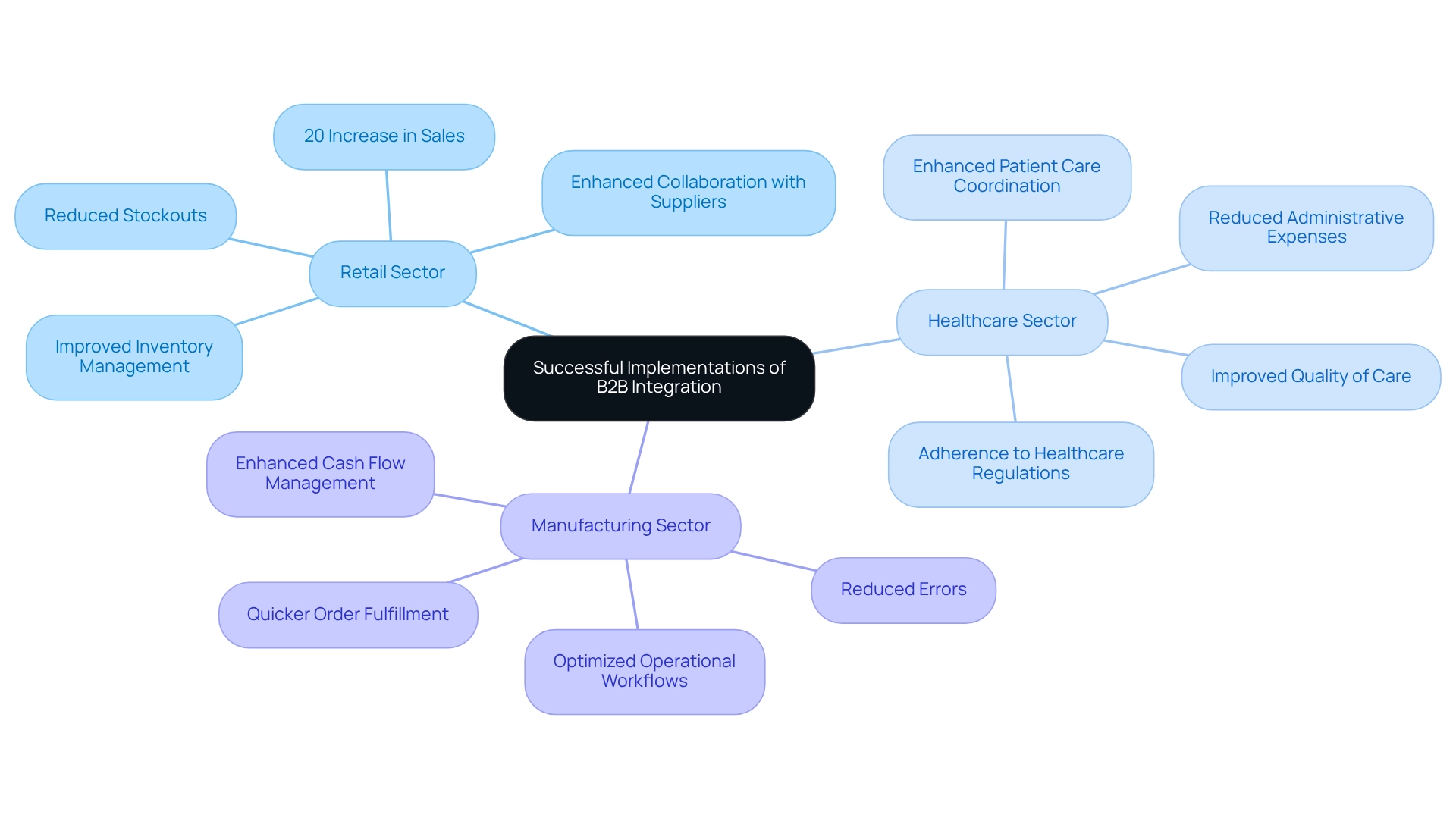
The Future of B2B Integration: Trends and Innovations
The future of B2B connection is set to undergo transformative advancements, significantly influenced by emerging technologies and the evolving requirements of enterprises. Key trends to monitor include:
- AI and Machine Learning: The integration of AI and machine learning is anticipated to significantly enhance data processing capabilities. As Sharat Sharan, Co-Founder, President and CEO of ON24, aptly states, “AI is more than a trend: It’s a necessity for organizations, and our research shows that those that don’t adapt will get left behind.” This evolution will facilitate predictive analytics, enabling organizations to make smarter, data-driven decisions that can swiftly adapt to market changes.
- Increased Automation: Automation will remain a cornerstone of B2B processes, minimizing manual intervention and driving efficiency. Statistics indicate that 42.5% of businesses in information and cultural industries reported a small reduction in tasks previously performed by employees. As organizations strive to optimize operations, automated workflows will streamline interactions and reduce the potential for errors. Avato’s hybrid unification platform plays a crucial role in this automation, converting unstructured information into structured requirements that can be easily managed and tested. This structured approach allows organizations to clearly define their needs, ensuring that all requirements are met effectively.
- The ongoing shift towards cloud-based solutions will offer organizations enhanced flexibility, scalability, and accessibility through B2B integration platforms. This transition enables companies to respond swiftly to changing demands and utilize B2B integration platforms to integrate disparate systems more effectively. The company provides a reliable, future-ready technology framework that empowers enterprises to adapt to evolving needs and update outdated systems, particularly in regulated sectors.
- Focus on Security: With the rise of sophisticated cyber threats, there will be a heightened emphasis on security measures. Organizations will prioritize advanced encryption techniques and real-time monitoring to safeguard sensitive data and maintain trust with partners. The company’s solutions are meticulously crafted to ensure smooth and secure data connectivity, addressing these essential security requirements.
- Collaboration Tools: The development of enhanced collaboration tools will significantly improve communication and coordination between trading partners. These tools will foster stronger partnerships, enabling organizations to work together more effectively and drive mutual success. The company’s commitment to designing robust technology foundations bolsters this collaborative approach, bridging the gap between legacy systems and contemporary expectations.
By staying informed about these trends, organizations can proactively enhance their B2B collaboration strategies, seizing new opportunities to maintain a competitive edge in an increasingly interconnected marketplace. However, it is crucial to recognize that most organizations have yet to experience significant bottom-line impacts from generative AI use. They are just beginning to implement best practices for adoption and scaling, with less than one-third of respondents adhering to most recommended practices. This underscores the maturity gap across different company sizes and highlights the importance of adopting structured approaches.
Get your copy now to discover how arvato can assist you in navigating these trends and transforming your strategies through a B2B integration platform.
Conclusion
The landscape of B2B integration is undeniably evolving, with platforms like Avato leading the charge towards enhanced operational efficiency and collaboration. B2B integration platforms are essential for automating workflows, improving data accuracy, and fostering stronger relationships between trading partners. The various integration solutions available—ranging from EDI to APIs—provide businesses with the flexibility needed to adapt to their unique requirements, ensuring they remain competitive in a rapidly changing market.
Moreover, the benefits of integrating B2B systems extend beyond operational efficiency; they also include significant cost savings, improved customer experiences, and the ability to swiftly respond to market demands. Despite the challenges organizations face, such as data standardization and security concerns, the strategic implementation of robust integration solutions can mitigate these issues and unlock new opportunities for growth.
Looking ahead, the trends in B2B integration, such as increased automation and the incorporation of AI, promise to further transform how businesses operate. Organizations that prioritize selecting the right integration platform will not only enhance their operational capabilities but also position themselves for sustained success in an increasingly interconnected world. Avato’s commitment to simplifying complex integrations and maximizing the value of legacy systems underscores its vital role in this transformation.
In conclusion, the future of B2B integration offers exciting possibilities. By embracing these innovative solutions, businesses can enhance their collaboration, streamline operations, and ultimately thrive in a competitive landscape. The time to invest in effective B2B integration strategies is now, as they lay the groundwork for future growth and success.

